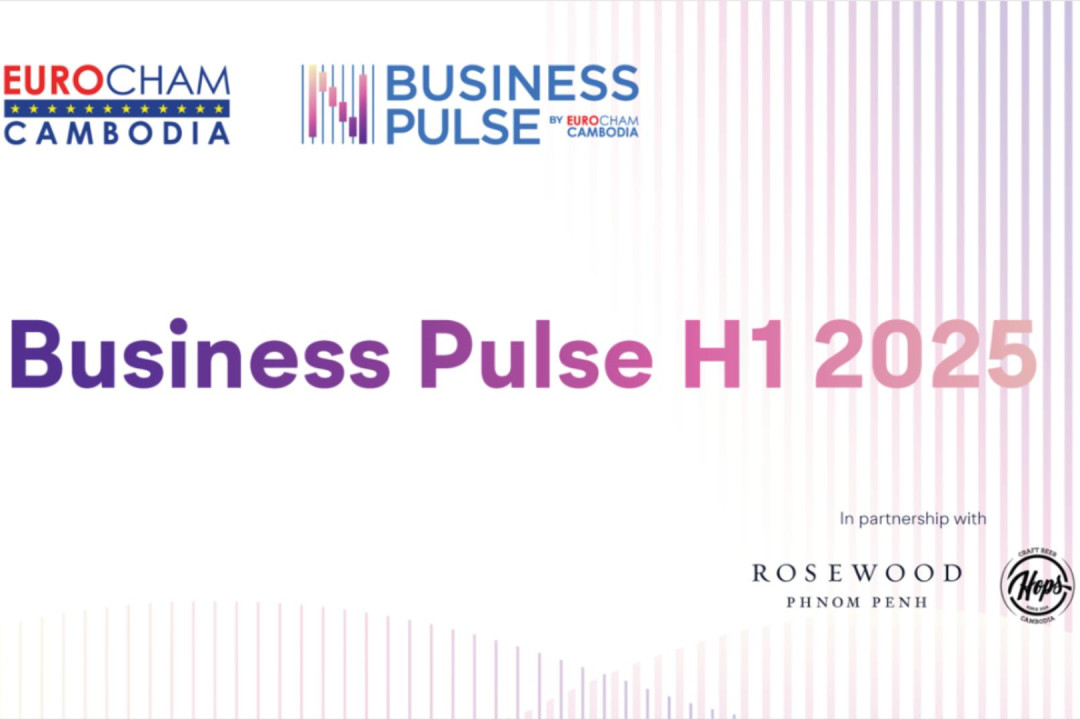EuroCham Cambodia Releases the Business Pulse H1 2025: A Snapshot of Private Sector Confidence Amid Uncertainty

EuroCham Cambodia has officially released the Business Pulse H1 2025 Report, providing an in-depth look at business sentiment and economic trends across Cambodia’s most dynamic sectors, including real estate and construction, tourism and hospitality, agriculture and food processing, consumer products, financial services, and other services (legal, consulting, auditing, and accounting).
As one of the Chamber’s flagship research initiatives, the Business Pulse delivers a data-driven perspective from EuroCham members, offering valuable insights into market confidence, investment conditions, and the challenges shaping Cambodia’s economic landscape.
This edition of the survey captures responses from enterprises of all sizes, reflecting the realities of doing business in a year marked by regional instability and shifting trade dynamics. Despite a complex environment, the findings reveal cautious optimism among Cambodian businesses.
The results show that the overall business environment became more challenging in early 2025, with agriculture and food processing and tourism and hospitality companies particularly affected by external pressures. Revenue performance has improved for financial services companies but declined in most sectors, especially real estate and construction and other services.
Two developments were cited as having the most significant short-term impact:
- the Thailand–Cambodia border dispute, which disrupted supply chains for nearly four in ten businesses, particularly in logistics, agriculture, and tourism; and
- the United States tariff announcements, which led to delays in investment decisions and increased cost pressures for exporters.
Despite these challenges, the survey highlights encouraging trends in the consumer products and financial services sectors, where demand and confidence remain steady. Importantly, the report finds that Cambodia’s reputation as an investment destination has risen in the first half of the year; however, respondents remain reluctant to recommend entering the market.
Operationally, one-third of companies surveyed plan to reduce costs in the second half of 2025 (H2 2025), mainly through cutting staff (51 per cent), marketing (45 per cent), and training expenses (26 per cent). The US dollar remains the dominant currency for business transactions in Cambodia, while use of the Khmer riel and euro has declined.
“Access to reliable business information is vital for making informed decisions, yet first-hand market data remains hard to obtain in Cambodia,” said Executive Director Martin Brisson. “Our latest Business Pulse Survey gives voice to EuroCham members, offering fresh insights on market performance, business forecasts, expansion plans, and the impact of issues like the Thai–Cambodia border disruptions and US tariffs.”
Financial Services
“From January to June 2025, Cambodia’s financial services sector showed resilience, but also signs of strain.
Outstanding loans across the banking and financial institutions grew only 2.9 per cent year-on-year to around USD 61.8 billion by June, a slowdown reflecting weak credit demand, especially in real estate and construction.
Deposits, however, expanded more strongly — up about 14.5 per cent to USD 61.5 billion. Non-performing loans (NPLs) continued to increase: the overall banking system NPL rate rose to approximately 8.3 per cent, from 7.4 per cent at end-2024.
Meanwhile, the microfinance sector also expanded: by the end of Q1 2025, microfinance loans reached USD 5.37 billion, up around 4.1 per cent from the previous quarter, with deposits at about USD 2.78 billion, though portfolio-at-risk (PAR > 30 days) remains a concern.
Liquidity and capital positions remain solid, but rising credit risk and slowing demand are becoming more of a concern,”
— Nicolas Hollanders, CEO, BRED Bank (Cambodia)
Tourism and Hospitality
“From January to June 2025, Cambodia’s tourism and hospitality sector saw steady gains, driven by stronger international arrivals and a boom in domestic travel. Cambodia welcomed about 3.36 million foreign tourists in H1 2025, up roughly 6.2 per cent year-on-year.
Angkor Archaeological Park received 567,673 international visitors in H1 2025, earning about USD 26.3 million in ticket revenue. This represents roughly 17 per cent of all international tourists to Cambodia during the same period.
On the infrastructure side, hotel supply in Phnom Penh rose modestly (by approximately 6 per cent) with new rooms added, while the new Techo International Airport in Phnom Penh is expected to open in Q3 2025 to further enhance connectivity.
Overall, the sector showed a healthy recovery, though performance remains uneven among source markets and regions,”
— Catherine Germier-Hamel, Founder & CEO, Millenium Destinations; Chair, EuroCham Cambodia Tourism & Hospitality Committee
Agriculture and Food Processing
“From January to June 2025, Cambodia’s agriculture and food-processing sector posted a strong performance, especially on the export side. Crop exports in H1 rose by around 27 per cent year-on-year to 7.83 million tonnes, earning USD 2.87 billion.
Non-rice crops were the major contributor, accounting for over USD 2 billion, while paddy and milled rice added USD 638 million and USD 307 million, respectively.
Some products saw mixed results: cashew nut exports surged by about 56 per cent, but fresh cassava, maize, and mangoes saw declines, partly because much of the output was absorbed domestically (for animal feed or processing).
On the input side, imports of fertilisers increased by over 22 per cent, and machinery such as tractors and bulldozers also rose, reflecting efforts to boost productivity.
While food processing remains underdeveloped (only about 10 per cent of agricultural output is processed domestically), there is a growing government focus on value addition,”
— Sovithya Sothy, Chair, 8S Agro-Industry and 8S Group; Chair, EuroCham Cambodia Agribusiness Committee
The Business Pulse H1 2025 Report also provides a forward-looking analysis of business priorities, cost pressures, and investment sentiment, offering practical insights to guide both policymakers and the private sector.
The full report, including detailed sectoral breakdowns, trend analysis, and policy recommendations, is now available for download on the EuroCham Cambodia website.